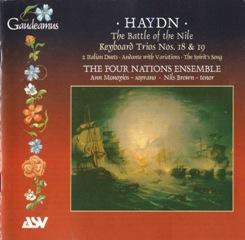Joseph Haydn – The Battle of The Nile (2001)
Joseph Haydn – The Battle of The Nile (2001)

1-3 Keyboard Trio No. 19 (Sonata) in G minor (1794)
4 – 5 Two Italian Duets (1796)
- Senti qui
- Guarda qui
6 Andante with Variations in F minor (1793)
7 The Spirit's Song (1800)
8 The Battle of the Nile (1800)
9 – 11 Keyboard Trio No. 18 (Sonata) in A (1794)
Ryan Brown, violin
Loretta O'Sullivan, cello
Anna Monoyios, soprano
Nils Brown, tenor
The Four Nations Ensemble
Andrew Appel, fortepiano & director
Several Haydns are on display here, although all of these works bear the unmistakable grace (and signature) of Franz Joseph. The first Haydn churns out exemplary if not terribly memorable chamber works (the same Haydn of the endless baryton trios), music that director and fortepianist Andrew Appel earnestly beseeches us to pay more attention to (the keyboard trios in particular). This Haydn is rewarded with loving, careful performances here, but I still can’t bring myself to rank these works among the composer’s best. (Sorry, Mr. Appel.) The second Haydn produces gleaming little vocal pieces, skillful portraits of emotions bubbly (the Two Dialogues), melancholy (The Spirit’s Song), or obsequiously patriotic (The Battle of the Nile, penned in honor of Lord Nelson upon his visit to the Esterhazys). The third Haydn is the genius of the Andante with Variations in F minor, a deeply introspective work that foreshadows German Romanticism.
Among the real treats of this disc, though, are the all-too-brief Two Italian Duets, superbly sung by Ann Monoyios and Nils Brown, who actually sound as though they were having a lot of fun recording this together. The agile soprano simply floats over the arabesque-like (and none too easy) figures that Haydn demands of her, particularly in the first duet (“Senti qui”). She even manages to spin gold out of the flossy Battle of the Nile, an empty piece whose keyboard part stumps from major chord to major chord with little grace. The Australian-born, Montreal-based Brown has terrific enunciation–every word is crystal clear. Although he possesses tremendous power (which he lets us glimpse ever so briefly in the Italian Duets), he is careful never to overwhelm his partners; Brown and Appel strike a difficult balance in The Spirit Song. The sound is clean if slightly thin and dry. If you’re fascinated by the Haydn of the string quartets and the symphonies, you won’t necessarily find him here, but you’ll come across a rather compelling set of characters all the same. ---classicstoday.com
download: uploaded yandex anonfiles 4shared solidfiles mediafire mega filecloudio nornar








